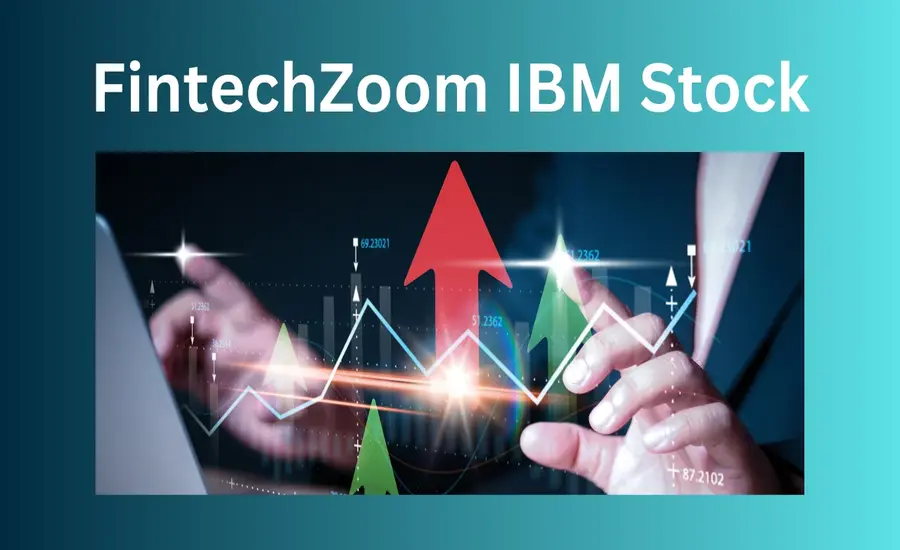Tech
FintechZoom IBM Stock: A Comprehensive Analysis

The landscape of financial technology (fintech) has experienced monumental shifts in recent years, with platforms like FintechZoom becoming essential resources for investors seeking comprehensive insights. One of the most talked-about stocks among FintechZoom users is IBM (International Business Machines Corporation), a company that has been at the forefront of innovation for over a century. This article delves deeply into the nuances of IBM’s stock performance, its strategic initiatives, and how FintechZoom’s tools and analytics can empower investors in their decision-making processes.
IBM: A Legacy of Innovation and Transformation
IBM’s history dates back to the early 20th century, establishing its reputation as a pioneer in technology and business solutions. From inventing the mainframe to developing cutting-edge artificial intelligence (AI) systems like Watson, IBM has continuously reinvented itself to stay relevant in an ever-changing market. However, this legacy comes with challenges as IBM transitions from traditional hardware and services to focus more on software, hybrid cloud solutions, and AI.
For investors, IBM’s ability to adapt and transform its business model is a critical factor in assessing the stock’s potential. The company’s extensive patent portfolio and ongoing research initiatives are indicative of its commitment to innovation. Yet, questions remain about whether these efforts can sustain long-term revenue growth and shareholder value, especially given the intense competition in the tech sector.

Recent Financial Performance and Stock Trends
IBM’s stock performance in recent years has been characterized by moderate growth, fluctuating earnings, and a consistent focus on dividends. Investors seeking stability often gravitate toward IBM for its dependable dividend yield, which remains a significant draw in a volatile market.
Key Metrics to Consider:
- Revenue Trends: IBM’s revenue growth has been uneven, with periods of stagnation primarily attributed to its legacy businesses. The company’s strategic pivot toward cloud computing, particularly following its acquisition of Red Hat, has shown promise but has yet to fully offset declines in other segments.
- Earnings Per Share (EPS): The EPS for IBM reflects the company’s efforts to streamline operations and enhance profitability. Cost-cutting measures, divestitures, and an emphasis on high-margin businesses have contributed to steady, albeit modest, EPS growth.
- Debt Levels: IBM’s debt levels have drawn scrutiny, particularly following the $34 billion Red Hat acquisition. While the acquisition bolstered IBM’s cloud capabilities, it also increased financial leverage, raising concerns about the company’s ability to manage its obligations effectively.
- Dividend Yield: With a yield consistently above 4%, IBM remains an attractive option for income-focused investors. However, maintaining this dividend requires sustained cash flow generation, which hinges on the success of IBM’s cloud and AI initiatives.
IBM’s Strategic Focus: Cloud Computing and Artificial Intelligence
IBM’s strategic priorities have increasingly centered on hybrid cloud and AI, both of which represent significant growth opportunities. The acquisition of Red Hat in 2019 marked a turning point for IBM, enabling the company to position itself as a leader in the hybrid cloud market. Hybrid cloud, which allows businesses to seamlessly integrate private and public cloud solutions, is a critical area of focus as enterprises seek flexibility and scalability in their IT infrastructure.
Why Hybrid Cloud Matters:
- Market Growth: The hybrid cloud market is projected to grow at a compound annual growth rate (CAGR) of over 20% in the next decade, driven by increasing digital transformation initiatives across industries.
- IBM’s Competitive Edge: Red Hat’s open-source technology, combined with IBM’s expertise in enterprise solutions, gives the company a unique value proposition in this space. IBM has also launched products like Cloud Paks to simplify cloud adoption for businesses.
- Challenges and Competition: Despite its strong positioning, IBM faces stiff competition from tech giants like Microsoft, Amazon (AWS), and Google Cloud. These companies have larger cloud market shares and deeper resources, making it essential for IBM to differentiate itself through innovation and partnerships.
On the AI front, IBM’s Watson platform is a notable example of its efforts to commercialize artificial intelligence. While Watson gained significant attention for its ability to compete on “Jeopardy!”, its real-world applications in healthcare, finance, and customer service have yielded mixed results. For investors, the question remains whether IBM can scale its AI solutions effectively to drive meaningful revenue growth.
IBM Stock Performance: Insights from FintechZoom
FintechZoom has emerged as a vital tool for investors analyzing IBM’s stock. The platform provides real-time market data, in-depth analytics, and user-generated insights, making it easier to evaluate IBM’s performance. One of FintechZoom’s standout features is its ability to aggregate sentiment analysis from social media, news articles, and forums, offering a holistic view of investor perceptions.
How FintechZoom Enhances IBM Stock Analysis:
- Real-Time Data: FintechZoom provides up-to-the-minute stock prices, volume trends, and technical indicators, enabling investors to make informed decisions quickly.
- Analyst Ratings: The platform consolidates analyst opinions, offering consensus ratings on whether IBM is a “buy,” “hold,” or “sell.”
- Peer Comparisons: With FintechZoom, investors can easily compare IBM’s performance against competitors like Microsoft, Oracle, and Salesforce, identifying relative strengths and weaknesses.
- Custom Alerts: FintechZoom’s customizable alerts ensure that users stay informed about key developments, such as earnings announcements, stock price movements, and news events impacting IBM.
By leveraging FintechZoom’s comprehensive analytics, investors can gain a deeper understanding of IBM’s stock dynamics, helping them navigate the complexities of the market.
Pros and Cons of Investing in IBM
For potential investors, evaluating the pros and cons of investing in IBM is essential. While the company offers compelling opportunities, particularly in cloud and AI, it also faces significant challenges.
Pros:
- Stable Dividend: IBM’s consistent dividend payments make it an attractive choice for income-focused investors.
- Strategic Acquisitions: The Red Hat acquisition has strengthened IBM’s position in the hybrid cloud market.
- Strong Patent Portfolio: IBM’s extensive patents reflect its commitment to innovation and long-term competitiveness.
Cons:
- Debt Levels: High debt resulting from acquisitions raises concerns about financial stability.
- Legacy Business Declines: IBM’s traditional hardware and services businesses continue to face revenue declines.
- Intense Competition: IBM’s competitors in the cloud and AI markets have larger market shares and greater resources.

The Future of IBM Stock
IBM’s future hinges on its ability to execute its strategic priorities effectively. The company’s success in hybrid cloud and AI will be crucial for driving revenue growth and maintaining shareholder confidence. Additionally, IBM must address its debt levels and improve operational efficiency to remain competitive in a fast-evolving market.
For investors, IBM’s stock offers a blend of stability and potential growth. While the company’s dividend yield is a strong draw, its long-term prospects depend on the successful implementation of its cloud and AI strategies. Platforms like FintechZoom will continue to play a vital role in helping investors monitor IBM’s performance and make informed decisions.
Conclusion
FintechZoom’s analytical tools and IBM’s innovative legacy create a compelling narrative for investors exploring this stock. By focusing on key growth areas like hybrid cloud and AI, IBM has positioned itself to capitalize on emerging opportunities. However, challenges such as high debt, intense competition, and legacy business declines must be addressed for sustained success. For investors using FintechZoom, IBM represents both a promising opportunity and a reminder of the complexities of the tech industry. With the right strategies and tools, navigating these complexities can lead to informed, confident investment decisions.
FAQs:
1. What is FintechZoom, and how does it help with IBM stock analysis?
FintechZoom is a financial technology platform that provides real-time stock data, analytics, and market insights. It enhances IBM stock analysis by offering features like sentiment analysis, peer comparisons, analyst ratings, and custom alerts, enabling investors to make data-driven decisions.
2. Why is IBM stock a popular choice for investors?
IBM is a well-established company with a legacy of innovation. It offers a stable dividend yield and has strategically pivoted toward high-growth areas like hybrid cloud and AI, making it appealing for both income-focused and growth-oriented investors.
3. What are IBM’s key growth areas?
IBM’s growth strategy focuses on:
- Hybrid Cloud: Following the Red Hat acquisition, IBM has positioned itself as a leader in this market.
- Artificial Intelligence (AI): The company leverages its Watson platform for applications in industries like healthcare, finance, and customer service.
4. What are the risks associated with investing in IBM?
Key risks include:
- High debt levels due to acquisitions.
- Declining revenues in legacy hardware and services.
- Stiff competition from larger players like Microsoft, Amazon (AWS), and Google Cloud.
5. How does IBM’s dividend compare to other tech companies?
IBM offers a higher dividend yield than many tech companies, consistently exceeding 4%. This makes it attractive to income-focused investors, though maintaining this yield depends on strong cash flow generation.
6. What role does Red Hat play in IBM’s strategy?
Red Hat is integral to IBM’s hybrid cloud strategy. Its open-source technology complements IBM’s enterprise solutions, enabling the company to provide flexible and scalable cloud services for businesses.
-

 Biography1 year ago
Biography1 year agoMadeline Argy: Age, Height, and Family Background Revealed
-

 Blog1 year ago
Blog1 year agoDiscover The World Of Movies With Mkvcinemas.com
-

 Tech1 year ago
Tech1 year agoSimpCityForum: One of the Most Interesting Online Communities
-

 Latest News1 year ago
Latest News1 year agoWhy Relying Solely on Your Web Hosting Backups Could Be Your Biggest Mistake
-

 Blog1 year ago
Blog1 year agoWhat is FilthyGrid? Exploring the World of FilthyGrid
-

 Biography1 year ago
Biography1 year agoCelebrityMeet Christina Erika Carandini Lee?: All You Need To Know
-

 Biography1 year ago
Biography1 year agoMary Marquardt: The Woman Behind Harrison Ford’s Rise
-

 Biography1 year ago
Biography1 year agoHow Old Is SZA Daughter? Discover SZA Daughter’s Age, Name, and More
-

 Crypto Currency1 year ago
Crypto Currency1 year ago5starsstocks .com: How It’s Useful and Helpful
-

 Health & Fitness1 year ago
Health & Fitness1 year agoWhat Has Kiolopobgofit in It? Exploring the Enigmatic Concept

